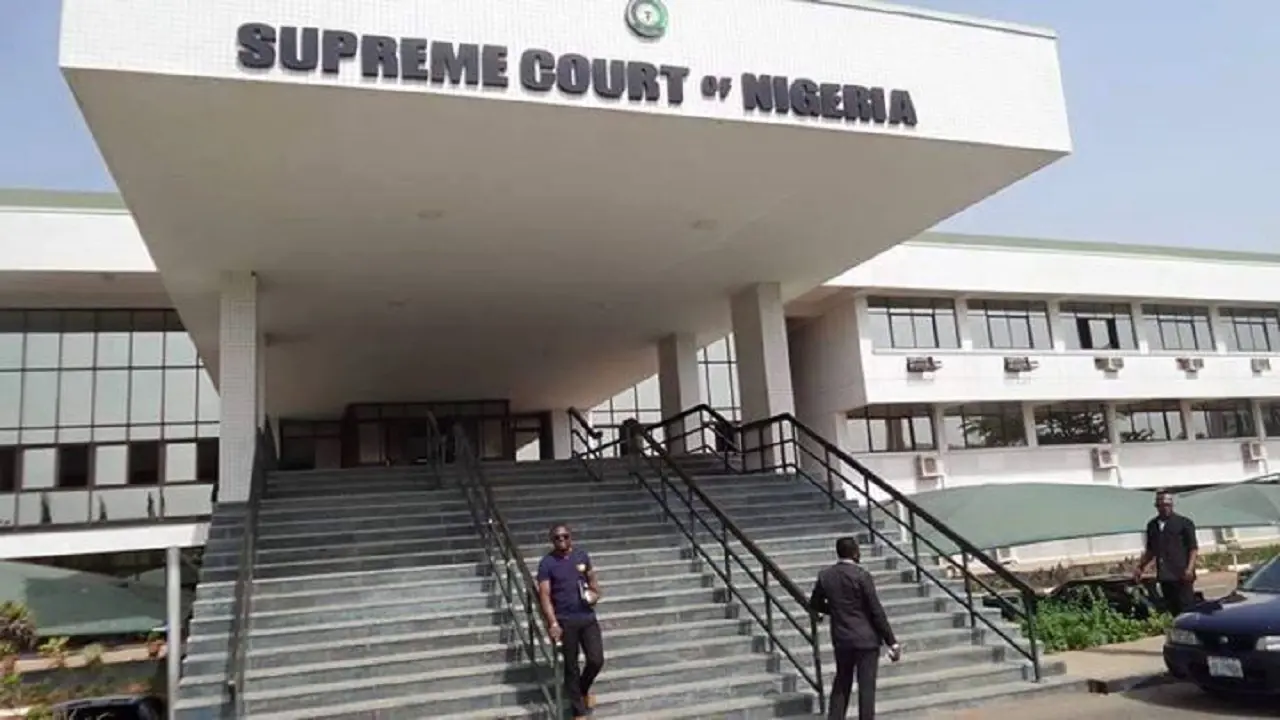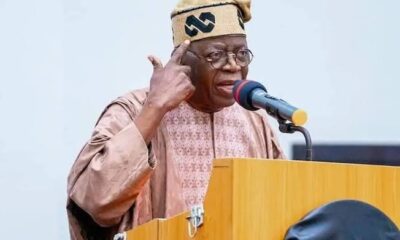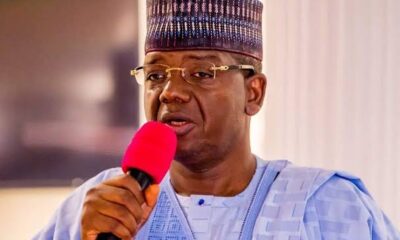Strictly Personal
Now that the Supreme Court has ruled, By Jideofor Adibe
Published
1 year agoon

The recent Supreme Court judgement which affirmed the ruling of the Presidential Election Petition Tribunal, was not unexpected. As Abimbola Adelaku, one of my favourite columnists, summed it in The Punch of November 2, 2023, “everyone – and by that I mean people who did not become Nigerians just last night”, did not expect a different outcome.
“Apart from a few who love histrionics and pretended to be pleasantly surprised, I do not know of anyone who imagined that a court that could remove an incumbent president in Nigeria had been composed,” she further wrote.
As the Court of the last resort in the country, the ruling brings to a close the legal challenges to the outcome of the February 25, 2023 presidential election. There are however lasting implications of the election, its aftermath and the ruling of the Supreme Court for the country. These include:
One, some overzealous supporters of the Tinubu government are already pushing the narrative that the ruling of the Supreme Court should be ‘the end of politics’ (to paraphrase Francis Fukuyama’s famous 1989 essay, ‘The End of History’, which he later published as a book in 1992). But this is only triumphalism masked under phrases such as “the time of politicking is over, it is now the time for governance”. Or: “The President should be allowed to concentrate on governance.”
The irony is that the advocates of “the end of politics” are themselves being political. They are either trying to stifle the voices of opposition or blackmail critics of the government, both of which are needed to keep the government on its toes in a democracy, for optimal performance. The self-appointed defenders of the polity would often grudgingly welcome “constructive criticisms” without telling us the metrics for determining the constructiveness of criticisms or who determines what is ‘constructive’ about any criticism.
The truth is that governments want to hear only the echo of their voices or their lap dogs and are usually uncomfortable with criticisms and critics. This constitutes a potential threat to democracy and is one of the reasons why the distrust of government is very high in mature democracies. This in turn is one of the reasons for the high premium placed on freedom of speech in such democracies.
Two, contrary to what many people think, it is not only political parties that could play opposition to the government of the day. Sections of the country could do that – as we saw with the South-West during the Second Republic, the Yar’Adua and Jonathan years (to a less extent). The South-East was also a bastion of opposition to the Buhari presidency. Civil society and labour groups could equally play the role of an opposition party. In this sense, the fear about the possible emasculation of opposition parties and groups which would imperil our democracy seems unlikely..
Three, it will be difficult for INEC to overcome the sort of legitimacy crisis that has engulfed the electoral umpire since the last presidential election for as long it is headed by Professor Mahmoud Yakubu. True, to be chairman of INEC has always been a poisoned chalice and losers always cry foul. However, in the last election, perceptions of incompetence and complicity in perpetrating electoral frauds were so widespread and so well documented by both local and international observers that confidence on the electoral body seems to be at an all-time low since the tenure of Professor Maurice Iwu. In climes where public officials care about honour, Professor Yakubu would have since stepped aside, if not for anything, as a way of taking responsibility for the failings of the electoral umpire despite the humongous sums sunk into it.
Four, the election and the subsequent Supreme Court judgement also underline the need for more electoral reforms. First, there is an urgent need to make it mandatory that all legal disputes are concluded before the inauguration of the President because as Abimbola Adelabu aptly put it in her very compelling column, the court that will have the gravitas to remove an incumbent President from office is yet to be constituted – and may not be constituted in the nearest future. Second, it may be time to consider having a Presidential Council of six (one from each geo-political zone) where the Council members will take turns in being president for two years while others will serve as Vice President with constitutionally designated powers.
This rotational presidency arrangement, currently practised in Switzerland and the European Union, will not only address fears of being marginalised by various parts of the country, it will also speak to the anarchic nature of our politics. One of the reasons for the Hobbesian nature of our politics is its winner-takes-all character: there is a pervasive fear that the group that wins the presidency will use its enormous powers to privilege its in-group and disadvantage the others.
The Buhari government took this abuse of fairness to a new low (while apparently mocking the rest of us with periodic declarations that his conscience was clear on allegations that he was nepotistic. The Tinubu government seems intent on continuing or even besting that legacy of nepotism, which could mean that by the time he completes his tenure, this may become ‘normalised’, and future leaders will see their tenures as the ‘turn’ of their own ethnic/religious group.
By having representatives of the six geopolitical zones in the Presidential Council, and enshrining in the Constitution that certain decisions or appointments must require the concurrence of all members of the Council) the fear of marginalisation will be attenuated. A single term tenure of 12 years for the Presidential Council will equally give everyone a break from politics which seems to have deepened our fault lines. In any case, it will seem that an increasing number of Nigerians do not even believe that their votes count or that elections are credible vehicles for leadership recruitment. So why waste time and resources on them every four years?
“Ironically, while using presidential powers to privilege a President’s in-groups and disadvantage or weaken others seen as rivals or non-supporters may be the new normal, it actually attracts resentment to the supposed benefitting ethnic group. For instance, it is thought that one of the reasons why it was easy for the rest of the country to unite against the Igbo (who formed the majority in the short-lived Biafran Republic) during the Civil War was the resentment against them arising from their perceived domination of the country during the First Republic.
Similarly, Buhari’s perceived privileging of Hausa/Fulani / Kanuri Muslims during his presidency, led to an unbridled and unfair profiling of the Fulanis during his tenure, with talks of ‘Fulanisation’ morphing into an anti-government mantra. Additionally, quite often some members of the supposed benefitting in-group will be among the most vociferous critics of the act of injustice against others as we saw with Northern Muslims leading the criticisms of Buhari’s nepotism and some Yoruba intellectuals already complaining loudly that cornering the juiciest of appointments does not reflect what the ethnic group stands for.
Five, the election and subsequent Supreme Court judgement once more highlights the fickleness of human loyalty and the transactional character of some politicians, sycophants and influence seekers and peddlers. For instance, shortly after INEC’s declaration of Tinubu as the President-elect, some in the above named category gradually began to adjust their rhetoric to court the attention of the new man in power. One particular character who, prior to the declaration of Tinubu as President carried himself as Atiku’s alter ego, suddenly and shamelessly began to sing a new song.
He sought to ingratiate himself to a man he had openly called all sorts of names, including a baron by tapping into the government’s perceived proclivities, including praising the Yoruba as the best ethnic group in the world, while berating those he feels are on the black book of the President. We also saw a Senator decamp to the new ruling party, praising the President for his supposed “fairness to all parts of the country”.
The election and the active controversies it triggered also exposed many Nigerians, from across the divides, including some who were previously regarded as national icons, as no more than closet ethnic chauvinists. The reputation of many of these people is unlikely to recover from this. In the end, the election and its aftermath marked the triumph of politics without principle, and with the Supreme Court judgement, the triumph of the philosophy of the goat follows the man with the palm fronds. Or a triumph of identity politics over politics of principles.
You may like
-


Nigeria: 614,937 killed, 2.2m abducted in 1 year— Report
-


Nigeria obtains $600 million international loans for agriculture
-


Nigeria’s November inflation rate hits 34.60%
-


‘I don’t take pleasure in causing you pains,’ Tinubu tells Nigerians amid hardship
-


Nigeria’s Dangote Refinery exports first fuel to Cameroon
-


Nigeria: President Tinubu’s reforms, economic policies yielding positive results— Minister
Strictly Personal
Let’s merge EAC and Igad, By Nuur Mohamud Sheekh
Published
3 weeks agoon
November 27, 2024
In an era of political and economic uncertainty, global crises and diminishing donor contributions, Africa’s regional economic communities (RECs) must reimagine their approach to regional integration.
The East African Community (EAC) and the Intergovernmental Authority on Development (Igad), two critical RECs in East Africa and the Horn of Africa have an unprecedented opportunity to join forces, leveraging their respective strengths to drive sustainable peace and development and advance regional economic integration and promote the African Continental Free Trade Area (AfCFTA).
Already, four of the eight Igad member states are also members of the EAC and, with Ethiopia and Sudan showing interest, the new unified bloc would be formidable.
Igad’s strength lies in regional peacemaking, preventive diplomacy, security, and resilience, especially in a region plagued by protracted conflicts, climate challenges, and humanitarian crises. The EAC, on the other hand, has made remarkable strides in economic integration, exemplified by its Customs Union, Common Market, and ongoing efforts toward a monetary union. Combining these comparative advantages would create a formidable entity capable of addressing complex challenges holistically.
Imagine a REC that pairs Igad’s conflict resolution strengths with the EAC’s diplomatic standing and robust economic framework. Member states of both are also contributing troops to peacekeeping missions. Such a fusion would streamline efforts to create a peaceful and economically prosperous region, addressing the root causes of instability while simultaneously promoting trade investment and regional cooperation.
These strengths will be harnessed to deal with inter-state tensions that we are currently witnessing, including between Ethiopia and Somalia over the Somaliland MoU, strained relations between Djibouti and Eritrea, and the continually deteriorating relations between Eritrea and Ethiopia.
The global economy experienced as a result of the COVID-19 pandemic, compounded by the Ukraine war and competing global crises, has strained donor countries and reduced financial contributions to multilateral organisations and African RECs. Member states, many of which are grappling with fiscal constraints, are increasingly unable to fill this gap, failing to make timely contributions, which is in turn affecting key mandate areas of Igad and EAC, and staff morale.
A merger between Igad and EAC would alleviate this financial pressure by eliminating redundancies. Shared administrative systems, integrated programmes, and a unified leadership structure would optimise resources, enabling the new REC to achieve more with less. Staff rationalisation, while sensitive, is a necessary step to ensure that limited funds are channelled toward impactful initiatives rather than duplicative overheads.
The African Union (AU) envisions a fully integrated Africa, with RECs serving as the building blocks of the AfCFTA. A unified EAC-Igad entity would become a powerhouse for regional integration, unlocking economies of scale and harmonising policies across a wider geographical and economic landscape.
This merger would enhance the implementation of the AfCFTA by creating a larger, more cohesive market that attracts investment, fosters innovation, and increases competitiveness. By aligning trade policies, infrastructure projects, and regulatory frameworks, the new REC could serve as a model for others, accelerating continental integration.
The road to integration is not without obstacles. Political will, divergent institutional mandates, and the complexity of harmonising systems pose significant challenges. However, these hurdles are surmountable through inclusive dialogue, strong leadership, and a phased approach to integration.
Member states must prioritise the long-term benefits of unity over short-term political considerations. Civil society, the private sector, the youth, and international partners also have a critical role to play in advocating for and supporting this transformative initiative.
The time for EAC and Igad to join forces is now. By merging into a single REC, they would pool their strengths, optimise resources, and position themselves as a driving force for regional and continental integration. In doing so, they would not only secure a prosperous future for their citizens and member states but also advance the broader vision of an integrated and thriving Africa.
As the world grapples with crises, Africa must look inward, embracing the power of unity to achieve its potential. A combined Igad-EAC is the bold step forward that the continent needs.
Nuur Mohamud Sheekh, a diplomatic and geopolitical analyst based in London, is a former spokesperson of the Igad Executive Secretary. X: @NuursViews
Strictly Personal
Budgets, budgeting and budget financing, By Sheriffdeen A. Tella, Ph.D.
Published
4 weeks agoon
November 20, 2024
The budget season is here again. It is an institutional and desirable annual ritual. Revenue collection and spending at the federal, State and local government levels must be authorised and guided by law. That is what budget is all about. A document containing the estimates of projected revenues from identified sources and the proposed expenditure for different sectors in the appropriate level of government. The last two weeks have seen the delivery of budget drafts to various Houses of Assembly and the promise that the federal government would present its draft budget to the National Assembly.
Do people still look forward to the budget presentation and the contents therein? I am not sure. Citizens have realised that these days, governments often spend money without reference to the approved budget. A governor can just wake up and direct that a police station be built in a location. With no allocation in the budget, the station will be completed in three months. The President can direct from his bathroom that 72 trailers of maize be distributed to the 36 states as palliatives. No budget provision, and no discussion by relevant committee or group.
We still operate with the military mentality. We operated too long under the military and of the five Presidents we have in this democracy, two of them were retired military Heads of State. Between them, they spent 16 years of 25 years of democratic governance. Hopefully, we are done with them physically but not mentally. Most present governors grew up largely under military regimes with the command system. That is why some see themselves as emperor and act accordingly. Their direct staff and commissioners are “Yes” men and women. There is need for disorientation.
The importance of budget in the art of governance cannot be overemphasized. It is one of the major functions of the legislature because without the consideration and authorisation of spending of funds by this arm of government, the executive has no power to start spending money. There is what we refer to as a budget cycle or stages. The budget drafting stage within the purview of the executive arm is the first stage and, followed by the authorisation stage where the legislature discusses, evaluates and tinkers with the draft for approval before presenting it to the President for his signature.
Thereafter, the budget enters the execution phase or cycle where programmes and projects are executed by the executive arm with the legislature carrying out oversight functions. Finally, we enter the auditing phase when the federal and State Auditors verify and report on the execution of the budgets. The report would normally be submitted to the Legislature. Many Auditor Generals have fallen victim at this stage for daring to query the executives on some aspects of the execution in their reports.
A new budget should contain the objectives and achievements of the preceding budget in the introduction as the foundation for the budget. More appropriately, a current budget derives its strength from a medium-term framework which also derives its strength from a national Development Plan or a State Plan. An approved National Plan does not exist currently, although the Plan launched by the Muhammadu Buhari administration is in the cooler. President Tinubu, who is acclaimed to be the architect of the Lagos State long-term Plan seems curiously, disillusioned with a national Plan.
Some States like Oyo and Kaduna, have long-term Plans that serve as the source of their annual budgets. Economists and policymakers see development plans as instruments of salvation for developing countries. Mike Obadan, the former Director General of the moribund Nigeria Centre for Economic and Management Administration, opined that a Plan in a developing country serves as an instrument to eradicate poverty, achieve high rates of economic growth and promote economic and social development.
The Nigerian development plans were on course until the adoption of the World Bank/IMF-inspired Structural Adjustment Programme in 1986 when the country and others that adopted the programme were forced to abandon such plan for short-term stabilisation policies in the name of a rolling plan. We have been rolling in the mud since that time. One is not surprised that the Tinubu administration is not looking at the Buhari Development Plan since the government is World Bank/IMF compliant. It was in the news last week that our President is an American asset and by extension, Nigeria’s policies must be defined by America which controls the Bretton Woods institutions.
A national Plan allows the citizens to monitor quantitatively, the projects and programmes being executed or to be executed by the government through the budgeting procedure. It is part of the definitive measures of transparency and accountability which most Nigerian governments do not cherish. So, you cannot pin your government down to anything.
Budgets these days hardly contain budget performance in terms of revenue, expenditure and other achievements like several schools, hospitals, small-scale enterprises, etc, that the government got involved in successfully and partially. These are the foundation for a new budget like items brought forward in accounting documents. The new budget should state the new reforms or transformations that would be taking place. Reforms like shifting from dominance of recurrent expenditure to capital expenditure; moving from the provision of basic needs programmes to industrialisation, and from reliance on foreign loans to dependence on domestic fund mobilisation for executing the budget.
That brings us to the issue of budget deficit and borrowing. When an economy is in recession, expansionary fiscal policy is recommended. That is, the government will need to spend more than it receives to pump prime the economy. If this is taken, Nigeria has always had a deficit budget, implying that we are always in economic recession. The fact is that even when we had a surplus in our balance of payment that made it possible to pay off our debts, we still had a deficit budget. We are so used to borrowing at the national level that stopping it will look like the collapse of the Nigerian state. The States have also followed the trend. Ordinarily, since States are largely dependent on the federal government for funds, they should promote balanced budget.
The States are like a schoolboy who depends on his parents for school fees and feeding allowance but goes about borrowing from classmates. Definitely, it is the parents that will surely pay the debt. The debt forgiveness mentality plays a major role in the process. Having enjoyed debt forgiveness in the past, the federal government is always in the credit market and does not caution the State governments in participating in the market. Our Presidents don’t feel ashamed when they are begging for debt forgiveness in international forum where issues on global development are being discussed. Not less than twice I have watched the countenance of some Presidents, even from Africa, while they looked at our president with disdain when issues of debt forgiveness for African countries was raised.
In most cases, the government, both at the federal and state cannot show the product of loans, except those lent by institutions like the World Bank or African Development Bank for specific projects which are monitored by the lending institutions. In other cases, the loans are stolen and transferred abroad while we are paying the loans. In some other cases, the loans are diverted to projects other than what the proposal stated. There was a case of loans obtained based on establishing an international car park in the border of the State but diverted to finance the election of a politician in the State. The politician eventually lost the election but the citizens of the State have to be taxed to pay the loan. Somebody as “Nigeria we hail thee”.
Transformation in budgeting should commence subsequently at the State and federal level. Now that local government will enjoy some financial autonomy and therefore budgeting process, they should be legally barred from contracting foreign loans. They have no business participating in the market. They should promote balanced budget where proposed expenditures must equal the expected revenues from federal and internal sources. The State government that cannot mobilise, from records, up to 40 percent of its total budget from IGR should not be supported to contract foreign loans. The States should engage in a balanced budget. The federal government budget should shift away from huge allocations to recurrent expenditure towards capital expenditure for capital formation and within the context of a welfarist state.
Sheriffdeen A. Tella, Ph.D.
EDITOR’S PICK


DR Congo sues tech giant Apple over illegal mineral exploitation
The Democratic Republic of Congo (DRC), has filed a criminal case against the European subsidiaries of tech giant, Apple, accusing...


UNESCO lists Ghana’s Kente cloth as cultural heritage
The iconic Ghanaian Kente, a piece of clothing, has been recognized as a cultural heritage on UNESCO’s Representative List of...


Zambia: FOX report highlights persistent media harassment, calls for reforms
A new Freedom of Expression (FOX) report by the Media Institute for Southern Africa (MISA) Zambia, has raised concerns over...


Egyptian court upholds ex-presidential candidate Ahmed Tantawy’s sentence
Former presidential candidate, Ahmed Tantawy, and his campaign manager, Mohamed Abou El-Diar, were found guilty of faking election paperwork, and...


Court orders Uganda to compensate LRA war crimes victims
Uganda’s tribunal has ordered the government to pay up to 10 million Ugandan shillings ($2,740) to each victim of Lord’s...


Nigeria: 614,937 killed, 2.2m abducted in 1 year— Report
A new report released on Tuesday by the National Bureau of Statistics (NBS) has revealed that over 614,937 Nigerians were...


Seeking to expand ties in Africa, Indonesia’s Prabowo attends D-8 economic meeting in Egypt
According to the government, Indonesian President, Prabowo Subianto, travelled to Egypt on Tuesday to attend meetings of the D-8 Organisation...


M23 Angola peace talks break down as Congo, Rwanda dash hopes
Hopes of an agreement to end Congo’s M23 rebel conflict, which has displaced over 1.9 million people, were dashed when...


Nigeria obtains $600 million international loans for agriculture
To promote food security and rural development, the Nigerian government, through the Ministry of Agriculture and Food Security, has obtained...


Nigeria’s November inflation rate hits 34.60%
According to figures released by the statistics office on Monday, Nigeria’s inflation rate increased for the third consecutive month in...
Trending
-

 VenturesNow1 day ago
VenturesNow1 day agoNigeria’s November inflation rate hits 34.60%
-

 VenturesNow1 day ago
VenturesNow1 day agoNigeria obtains $600 million international loans for agriculture
-

 VenturesNow1 day ago
VenturesNow1 day agoIMF’s latest board reviews result in $182 million to Rwanda
-

 Politics1 day ago
Politics1 day agoM23 Angola peace talks break down as Congo, Rwanda dash hopes


